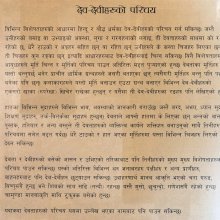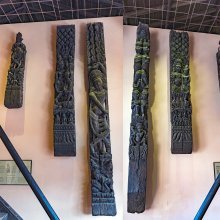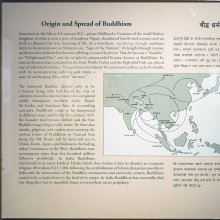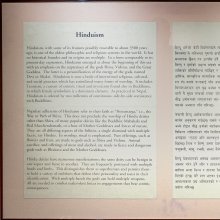Anya, Aṇya, Anyā: 20 definitions
Introduction:
Anya means something in Hinduism, Sanskrit, Jainism, Prakrit, Marathi, Hindi. If you want to know the exact meaning, history, etymology or English translation of this term then check out the descriptions on this page. Add your comment or reference to a book if you want to contribute to this summary article.
Alternative spellings of this word include Any.
Images (photo gallery)
In Hinduism
Purana and Itihasa (epic history)
Source: Cologne Digital Sanskrit Dictionaries: The Purana Index1a) Anya (अन्य).—A son of Bhṛgu.*
- * Vāyu-purāṇa 65. 87.
1b) A rājaṛṣi, becoming a Brāhmaṇa.*
- * Vāyu-purāṇa 91. 116.
Anyā (अन्या) refers to the name of a River mentioned in the Mahābhārata (cf. VI.10.30). Note: The Mahābhārata (mentioning Anyā) is a Sanskrit epic poem consisting of 100,000 ślokas (metrical verses) and is over 2000 years old.

The Purana (पुराण, purāṇas) refers to Sanskrit literature preserving ancient India’s vast cultural history, including historical legends, religious ceremonies, various arts and sciences. The eighteen mahapuranas total over 400,000 shlokas (metrical couplets) and date to at least several centuries BCE.
Chandas (prosody, study of Sanskrit metres)
Source: Shodhganga: a concise history of Sanskrit Chanda literatureAnyā (अन्या) refers to one of the 135 metres (chandas) mentioned by Nañjuṇḍa (1794-1868 C.E.) in his Vṛttaratnāvalī. Nañjuṇḍa was a poet of both Kannada and Sanskrit literature flourished in the court of the famous Kṛṣṇarāja Woḍeyar of Mysore. He introduces the names of these metres (e.g., Anyā) in 20 verses.

Chandas (छन्दस्) refers to Sanskrit prosody and represents one of the six Vedangas (auxiliary disciplines belonging to the study of the Vedas). The science of prosody (chandas-shastra) focusses on the study of the poetic meters such as the commonly known twenty-six metres mentioned by Pingalas.
Natyashastra (theatrics and dramaturgy)
Source: Shodhganga: The significance of the mūla-beras (natya)Anya (अन्य) is an alternative name for Parakīya, which refers to a “heroine of good character” and represents one of the three kinds of “heroines” (nāyikā) in a dramatic representation, according to the Abhinaya-sara-samputa, as used within the classical tradition of Indian dance and performance, also known as Bharatanatyam.—In the depiction of any mood or sentiment, a dance performance or a dramatic representation takes the medium of the hero (nāyaka) and the heroine (nāyikā). The nāyikās (heroines) are generally classified into three types [viz., Anya or Parakīya].

Natyashastra (नाट्यशास्त्र, nāṭyaśāstra) refers to both the ancient Indian tradition (shastra) of performing arts, (natya—theatrics, drama, dance, music), as well as the name of a Sanskrit work dealing with these subjects. It also teaches the rules for composing Dramatic plays (nataka), construction and performance of Theater, and Poetic works (kavya).
In Jainism
General definition (in Jainism)
Source: The University of Sydney: A study of the Twelve ReflectionsAnya (अन्य) (Cf. Anyatva) refers to “separate”, according to the Praśamaratiprakaraṇa 149-50 (p. 93-4).—Accordingly, “(A monk) should reflect, upon transcient [sic] nature of the world, helplessness, loneliness, separateness (anyatva) of the self from non-self, impurity (of the body), cycle of births sand [sic] rebirths, inflow of Karmas and stoppage of inflow of Karmas; Shedding of stock of Karmas, constitution of the universe, nature of true religion, difficulty in obtaining enlightenment, which are (called) twelve pure Bhāvanās (reflections)”.

Jainism is an Indian religion of Dharma whose doctrine revolves around harmlessness (ahimsa) towards every living being. The two major branches (Digambara and Svetambara) of Jainism stimulate self-control (or, shramana, ‘self-reliance’) and spiritual development through a path of peace for the soul to progess to the ultimate goal.
Languages of India and abroad
Marathi-English dictionary
Source: DDSA: The Molesworth Marathi and English Dictionaryanya (अन्य).—a (S) Another. 2 Other, different, diverse.
Source: DDSA: The Aryabhusan school dictionary, Marathi-Englishanya (अन्य).—a Another; different.
Marathi is an Indo-European language having over 70 million native speakers people in (predominantly) Maharashtra India. Marathi, like many other Indo-Aryan languages, evolved from early forms of Prakrit, which itself is a subset of Sanskrit, one of the most ancient languages of the world.
Sanskrit dictionary
Source: DDSA: The practical Sanskrit-English dictionaryAṇya (अण्य).—A kind of head of an arrow; Dhanur.
Derivable forms: aṇyam (अण्यम्).
--- OR ---
Anya (अन्य).—a. [an adhnyādi° ya; anyaḥ, nyasmai, °smāt; n. anyat &c.]
1) Another, different, other (bhinna); another, other (generally); स एव त्वन्यः क्षणेन भवतीति विचित्रमेतत् (sa eva tvanyaḥ kṣaṇena bhavatīti vicitrametat) Bh. 2.4; अन्यदेव भागधेयमेते निर्वपन्ति (anyadeva bhāgadheyamete nirvapanti) Ś.2; सर्वमन्यत् (sarvamanyat) everything else; किमुतान्यहिंस्राः (kimutānyahiṃsrāḥ) R.2.62; changed, altered; संप्रत्यन्ये वयम् (saṃpratyanye vayam) Bhartṛhari 3.66 quite different persons; oft. in comp. अन्यसङ्गात्, अनन्यसाधारण (anyasaṅgāt, ananyasādhāraṇa) &c.
2) Other than, different from, else than (with abl. or as last member of comp.); नास्ति जीवितादन्यदभिमततरमिह सर्वजन्तूनाम् (nāsti jīvitādanyadabhimatataramiha sarvajantūnām) K.35; कोऽस्ति धन्यो मदन्यः (ko'sti dhanyo madanyaḥ) Bv.4.37; उत्थितं ददृशेऽन्यञ्च कबन्धेभ्यो न किंचन (utthitaṃ dadṛśe'nyañca kabandhebhyo na kiṃcana) R.12.49; किमन्यदस्याः परिषदः श्रुतिप्रसादनतः (kimanyadasyāḥ pariṣadaḥ śrutiprasādanataḥ) Ś.1; oft. used in addition to ऋते (ṛte) or विना (vinā); ऋते समुद्रादन्यः को विभर्ति वडवानलम् (ṛte samudrādanyaḥ ko vibharti vaḍavānalam) Pañcatantra (Bombay) 5.35; किं नु खलु मे प्रियादर्श- नादृते शरणमन्यत् (kiṃ nu khalu me priyādarśa- nādṛte śaraṇamanyat) Ś.3.
3) Another person, one different from self (opp. sva, ātmīya); वासश्च धृतमन्यैर्न धारयेत् (vāsaśca dhṛtamanyairna dhārayet) Manusmṛti 4.66.
4) Strange, unusual, extraordinary; अन्य एव स प्रकारः (anya eva sa prakāraḥ) K.168; अन्या जगद्धितमयी मनसः प्रवृत्तिः (anyā jagaddhitamayī manasaḥ pravṛttiḥ) Bv. 1.69; धन्या मृदन्यैव सा (dhanyā mṛdanyaiva sā) S. D.
5) Ordinary, any one; निरातङ्कः कन्यामन्योऽपि याचते (nirātaṅkaḥ kanyāmanyo'pi yācate) Mv.1.31; cf. इतर (itara).
6) Additional, new, more; अन्यान् दशसुवर्णान्प्रयच्छ (anyān daśasuvarṇānprayaccha) Mṛcchakaṭika 2 another ten (coins); अन्यदन्यन्नलिनदलशयनम् (anyadanyannalinadalaśayanam) K.157 new and new (changing every now and then); अन्यस्मिन् दिवसे (anyasmin divase) another day; one of a number (with gen.); अन्यच्च (anyacca) moreover, besides, and again (used to connect sentences together); एक- अन्य (eka- anya) the one-the other; एकः सख्यास्तव सह मया वामपादाभिलाषी । काङ्क्षन्त्यन्यो वदनमदिरां दौहृदच्छद्मनास्याः (ekaḥ sakhyāstava saha mayā vāmapādābhilāṣī | kāṅkṣantyanyo vadanamadirāṃ dauhṛdacchadmanāsyāḥ) Meghadūta 8; see under एक (eka) also; अन्य-अन्य (anya-anya) one another; अन्यः करोति अन्यो भुङ्क्ते (anyaḥ karoti anyo bhuṅkte) one does, another suffers; अन्यन्मुखे अन्यन्निर्वहणे (anyanmukhe anyannirvahaṇe) Mu.5; अन्यदुग्तं जातमन्यत् (anyadugtaṃ jātamanyat) Manusmṛti 9.4,99; 8.24; कर्णे लगति चान्यस्य प्राणैरन्यो वियुज्यते (karṇe lagati cānyasya prāṇairanyo viyujyate) Pañcatantra (Bombay) 1.35; अन्यदुच्छृङ्खलं सत्त्वमन्यच्छास्त्र- नियन्त्रितं (anyaducchṛṅkhalaṃ sattvamanyacchāstra- niyantritaṃ) Śiśupālavadha 2.62; अन्य-अन्य-अन्य (anya-anya-anya) &c. one, another, third, fourth &c., जल्पन्ति सार्धमन्येन पश्यन्त्यन्यं सविभ्रमाः । हृद्गतं चिन्त- यन्त्यन्यं प्रियः को नाम योषिताम् (jalpanti sārdhamanyena paśyantyanyaṃ savibhramāḥ | hṛdgataṃ cinta- yantyanyaṃ priyaḥ ko nāma yoṣitām) Pañcatantra (Bombay) 1.135; मनस्यन्यद्ववचस्यन्यत् कार्यमन्यद् दुरात्मनाम् (manasyanyadvavacasyanyat kāryamanyad durātmanām) H.1.97.; (in pl.) केचित्-अन्ये (kecit-anye) someothers; एके-अन्ये-तथान्ये (eke-anye-tathānye) (bījameke praśaṃsanti kṣetramanye manīṣiṇaḥ | bījakṣetre tathaivānye tatreyaṃ tu vyavasthitiḥ ||) Manusmṛti 1.7;4.9;12.123. [cf. L. alius; Gr. allos for aljos, Zend anya].
--- OR ---
Anyā (अन्या).—a. Ved. Not drying up, inexhaustible; इन्द्रं धेनुं सुदुघामन्याम् (indraṃ dhenuṃ sudughāmanyām) Ṛgveda 8.1.1.
Source: Cologne Digital Sanskrit Dictionaries: Shabda-Sagara Sanskrit-English DictionaryAnya (अन्य).—mfn. (-nyaḥ-nyā-nyat) 1. Other, different. 2. Unlike. E. anya to live, and yak aff.
Source: Cologne Digital Sanskrit Dictionaries: Benfey Sanskrit-English DictionaryAnya (अन्य).—adj., f. yā, n. yad. 1. Other, [Mānavadharmaśāstra] 8, 17. 2. Different, [Hitopadeśa] i. [distich] 121. 3. with abl. Other than, [Rājataraṅgiṇī] 5, 178. (nānyaḥ Śaṅkaravarmaṇaḥ, no other than Śaṅkaravarman). 4. One, [Pañcatantra] 80, 16. 5. plur. The others, i. e. the rest, [Böhtlingk, Sanskrit Chrestomathy.] 219, 161. 6. acc. sing., n. yad. Besides, else, [Pañcatantra] 55, 9.
— Comparat. anyatara, f. rā. , n. rad, Either of two, [Mānavadharmaśāstra] 2, 111.
— Superl. anyatama, f. mā, Any one of more than two, [Mānavadharmaśāstra] 11, 25.
Source: Cologne Digital Sanskrit Dictionaries: Cappeller Sanskrit-English DictionaryAnya (अन्य).—([neuter] anyad) another, other, else, different from ([ablative]).
— anyacca and something else, i.e. further, again. anya (or eka)—anya the one—the other.
Source: Cologne Digital Sanskrit Dictionaries: Monier-Williams Sanskrit-English Dictionary1) Anya (अन्य):—1. anya (3), am, n. inexhaustibleness (as of the milk of cows), [Atharva-veda xii, 1, 4] (cf. anyā.).
2) 2 as, ā, at other, different
3) other than, different from, opposed to ([ablative] or in [compound])
4) another
5) another person
6) one of a number
7) anya anya or eka anya, the one, the other
8) anyac ca, and another, besides, moreover
9) cf. [Zend] anya; [Armenian] ail; [Latin] alius; [Gothic] aljis, Theme alja; [Greek] ἄλλος for ἄλγο-ς; cf. also ἔνιοι.
10) Anyā (अन्या):—(3) f. inexhaustible (as the milk of a cow), [Ṛg-veda viii, 1, 10 and 27, 11; Sāma-veda]
Source: Cologne Digital Sanskrit Dictionaries: Goldstücker Sanskrit-English DictionaryAnya (अन्य):—(see sarvanāman) 1. m. f. n. (-nyaḥ-nyā-nyad(-nyat), dat. -nyasmai -nyasyai-nyasmai, abl. -nyasmāt-nyasyāḥ-nyasmāt, gen. -nyasya-nyasyāḥ -nyasya, loc. -nyasmin-nyasyām-nyasmin; nom. plur. -nye-nyāḥ -nyāni, gen. -nyeṣām-nyāsām-nyeṣām; also with the aff. akac, e. g. nom. plur. anyake, gen. plur. anyakeṣām which forms therefore do not belong to a base anyaka q. v.) Other; [a.]) Other in general, e. g. kriyante kaṭāstvayā mayānyaiśca; also in the sense ‘besides, moreover, also’, e. g. ṛco yajūṃṣi cānyāni sāmāni vividhāni ca . eṣa jñeyastrivṛdvedo yī vedainaṃ sa vedavit . ādyaṃ yattryakṣaraṃ brahma trayī yasminpratiṣṭhitā . sa guhyonyastrivṛdvedo yastaṃ veda sa vedavit . ‘The Ṛchs, the Yajus, and besides the various Sāmaṃs…and what was first, Brahman, the syllable of three letters (a-u-m) on which rest the three Vedas, that, too, is the hidden threefold Veda &c.’.—The neuter anyad esp. with a following ca (anyacca) occurs frequently in the latter sense ‘besides, moreover’, to connect maximes or sentences loosely joined together; it is used then synonymously with aparaṃ ca and api ca.—In combinations anyasminnahani, anyasmindivase &c. ‘other’ is used in the same manner as in the corresponding ‘the other day’, lit. on some day other (than the present day). [b.]) Other implying similarity, similar (Ajayap.: = sadṛśatara), e. g. mitralābhaḥ suhṛdbhedo vigrahaḥ saṃdhirevaca . pañcatantrāttathānyasmādgranthādākṛṣya likhyate ‘Acquiring friends (the subject treated in the first) and the subjects treated in the three other books of the Hitopadeśa are represented such as they have been taken from the Panchatantra and a similar work’. [c.]) Other, implying dissimilarity, difference, opposition, i. e. different, opposed, reverse; e. g. virāmapratyayābhyāsapūrvaḥ saṃskāraśeṣonyaḥ ‘the meditation which is preceded by the repeated exercise of calm recognition (is that defined before); different from it (the reverse of it) is the meditation devoid of a specific object’. This notion of difference or opposition is often expressed in a still more distinct manner by putting the correlative terms eka, apara, kiṃcit, kiṃcana or anya itself in the opposed sentence or words, answering thus our ‘the one…the other’; e. g. dṛṣṭā mayetyupekṣaka eko dṛṣṭāhamityuparatānyā; or yathā kaścididaṃ kṣetraṃ madīyamiti kathayati . anyopi tadvirodhena madīyamiti; or na yoddhumaśakaṃkecinnāḍhaukiṣata kecana …vanaukasaḥ . udare cājarannanye &c.; or anyahaste tu vikrīya yonyahaste prayacchati &c.; or ahamanyaḥ śarīramanyat.—anyānyā (fem. ved.) one after the other, one in succession. (Sāy. = parasparavyatihāreṇa, or = ekaikā.) A noun, depending on anya ‘different from’ stands in the ablative, e. g. prajāpate na tvadetānyanyo viśvā rūpāṇi pari tā babhūva; or na tryambakādanyamupāsthitāsau (scil. daśarathaḥ); or prakṛtipuruṣayoranyatsarvamanityam; or anyadanyasmādananyatvādananyadityanyatābhāvaḥ. —In this case the noun, esp. a pronoun depending on anya forms in some rare instances, as a former part, a Tatpur. with anya as a latter part; e. g. paro madanyo jagatastasthuṣaśca otaṃ protaṃ paṭavadyatra viśvam; or anityā (scil. kṣitiḥ) tu tadanyā syāt; or rūpānyaccakṣuṣo yogyaṃ rūpamatrāpi kāraṇam. [d.]) One; see anyatas and the quotation s. v. anyatomukha. [In opposed sentences containing the correlat. anya—anya ‘the one…the other’ the first verb following anya may become anudātta; an instance given in the comm. of Pāṇini is: tayoranyaḥ pippalaṃ svādvattyanaśnannananyo abhi cākaśīti (where atti may be anudātta). As former part of a [karmadharaya compound] compound anya retains in some formations the final d of its neuter; see anyadāśā, anyadāśis, anyadāsthā, anyadāsthita, anyadutsuka, anyadūti, anyadrāga, but not in the [tatpurusha compound] anyāśā &c. qq. vv.; optionally in the Karmadh. anyadartha or anyārtha qq. vv., and always in the Karmadh. and [tatpurusha compound] anyatkāraka q. v.; comp. also anyatkāma and the derivative anyadīya.] 2. m.
(-nyaḥ) An enemy. (ved.) [If the aff. akac is placed before the endings of anya 1. m. f. n. or 2. m. the word assumes besides its own meaning the notion of diminution or deterioration, e. g. anyakeṣām ‘of contemptible enemies’ (comm.: kutsitā anyenyake…anyakeṣāṃ kutsitānāmanyeṣāṃ śatrūṇām); or anyake ‘a few others’ (comm.: anyake . alpā yenye.] 3. n. (-nyad) A blunder in reading, esp. in accentuating words, e. g. anyattvaṃ karoṣi, thou blunderest, i. e. thou readest e. g. an anudātta instead of an udātta (comm.: udātte kartavye yonudāttaṃ karoti &c.). Comp. aikānyika, dvaiyanyika, traiyanyika, dvādaśānyika, trayodaśānyika, caturdaśānyika. 4. f.
(-nyā) 1) The same as anyastrī q. v. [
2) A medical dictionary quotes this word in the femin. professedly on the authority of Dhanvantari, with the appended meanings hartakī (i. e. harītakī q. v.), mahāśraddhā and kṛṣṇacāriṇī, the two latter of which seem to be unknown, however, to the author himself. The correctness of this name seems rather doubtful.] E. The native etym. an ‘to breathe’, kṛt aff. ya is not very plausible; it is probably derived from the pronominal base a or an.
--- OR ---
Anyā (अन्या):—The feminine of anya ‘other, different’ &c. q. v. This word deserves notice only from the circumstance that it occurs in some vaidik passages with the udātta accent on the first syllable, instead of having this accent on the last syllable. [Sāyaṇa is not the author of the meaning ‘never drying-up’ and of an etym. ‘a and nyā, contracted of ni-yā’ which have been lent to this word by a new kind of vaidik exegesis.]
Source: Cologne Digital Sanskrit Dictionaries: Yates Sanskrit-English DictionaryAnya (अन्य):—[(nyaḥ-nyā-nyaṃ) a.] Other.
Source: DDSA: Paia-sadda-mahannavo; a comprehensive Prakrit Hindi dictionary (S)Anya (अन्य) in the Sanskrit language is related to the Prakrit word: Aṇṇa.
[Sanskrit to German]
Sanskrit, also spelled संस्कृतम् (saṃskṛtam), is an ancient language of India commonly seen as the grandmother of the Indo-European language family (even English!). Closely allied with Prakrit and Pali, Sanskrit is more exhaustive in both grammar and terms and has the most extensive collection of literature in the world, greatly surpassing its sister-languages Greek and Latin.
Hindi dictionary
Source: DDSA: A practical Hindi-English dictionaryAnya (अन्य) [Also spelled any]:—(a) other, another; different; —[purūṣa] third person (in Grammar).
...
Kannada-English dictionary
Source: Alar: Kannada-English corpusAnya (ಅನ್ಯ):—[adjective] not the same; distinct; separate; other; different; another.
--- OR ---
Anya (ಅನ್ಯ):—[noun] = ಅನ್ಯಕ [anyaka].
Kannada is a Dravidian language (as opposed to the Indo-European language family) mainly spoken in the southwestern region of India.
See also (Relevant definitions)
Starts with (+355): Anya nwona, Anyabandhu, Anyabhava, Anyabhavya, Anyabhrit, Anyabhrita, Anyabija, Anyabijaja, Anyabijasamudbhava, Anyabijotpanna, Anyacara, Anyacca, Anyacchayayoni, Anyacetas, Anyach, Anyachcha, Anyachitta, Anyacinta, Anyacitta, Anyacodita.
Ends with (+811): Abdhikanya, Abdravyapanya, Abhayaranya, Abhimanya, Abhirakanya, Abhivanya, Abhyanjanya, Abhyavadanya, Abrahmanya, Abrahyanya, Acaitanya, Acaranya, Achaitanya, Adanya, Adavanya, Adhanya, Adhikaranya, Adhimanya, Adhishavanya, Adhvanya.
Full-text (+389): Anyatas, Anyadrisha, Anyonya, Anyapurva, Anyadrish, Anyodarya, Anyajata, Anyabhrita, Anyabhrit, Anyodha, Ananya, Ananyaja, Anyaka, Anyadhina, Anyatra, Visubhati, Anyamatrija, Anyasadharana, Anyarashtriya, Anyanabhi.
Relevant text
Search found 86 books and stories containing Anya, Aṇya, Anyā; (plurals include: Anyas, Aṇyas, Anyās). You can also click to the full overview containing English textual excerpts. Below are direct links for the most relevant articles:
Rig Veda (translation and commentary) (by H. H. Wilson)
Garga Samhita (English) (by Danavir Goswami)
Verse 6.9.23 < [Chapter 9 - The Arrival of Śrī Dvārakā]
Verse 5.6.8 < [Chapter 6 - Seeing Śrī Mathurā]
Verse 6.9.26 < [Chapter 9 - The Arrival of Śrī Dvārakā]
Hari-bhakti-kalpa-latikā (by Sarasvati Thkura)
Sahitya-kaumudi by Baladeva Vidyabhushana (by Gaurapada Dāsa)
Text 10.85 < [Chapter 10 - Ornaments of Meaning]
Text 7.132 < [Chapter 7 - Literary Faults]
Text 10.165 < [Chapter 10 - Ornaments of Meaning]
Shrimad Bhagavad-gita (by Narayana Gosvami)
Verse 7.5 < [Chapter 7 - Vijñāna-Yoga (Yoga through Realization of Transcendental Knowledge)]
Verse 6.39 < [Chapter 6 - Dhyāna-yoga (Yoga through the Path of Meditation)]
Verse 18.69 < [Chapter 18 - Mokṣa-yoga (the Yoga of Liberation)]
Chaitanya Bhagavata (by Bhumipati Dāsa)
Verse 2.8.208 < [Chapter 8 - The Manifestation of Opulences]
Verse 1.1.55 < [Chapter 1 - Summary of Lord Gaura’s Pastimes]
Verse 3.3.4 < [Chapter 3 - Mahāprabhu’s Deliverance of Sarvabhauma, Exhibition of His Six-armed Form, and Journey to Bengal]
Related products




